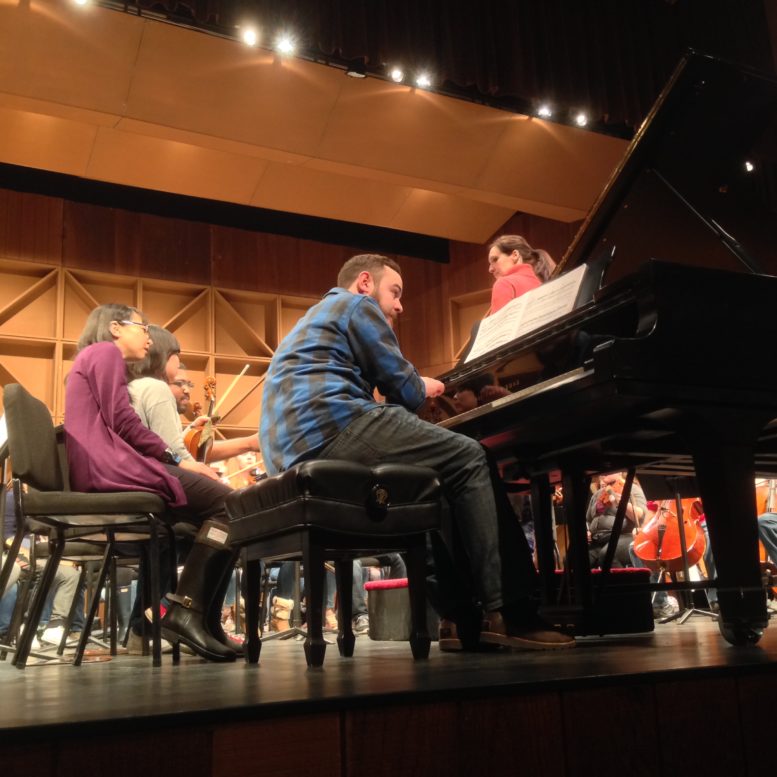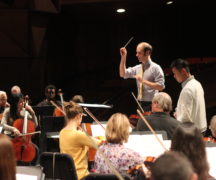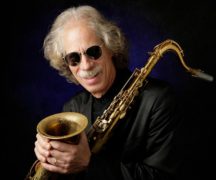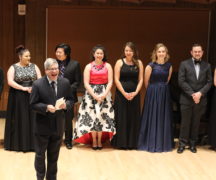By DAVID DUPONT
BG Independent News
The annual Concerto Concert at the Bowling Green State University College of Musical Arts puts students in the spotlight.
The soloists are students who won their chance in the spotlight in a competition in December. The conductors are students. And the Bowling Green Philharmonia is a student orchestra.
Listeners should expect, however, nothing less than a top quality in the performance.
Graduate student Zachary Nyce’s performance in the dress rehearsal of Witold Lutoslawski’s Concerto for Piano was proof of that.
The notes had hardly stopped reverberating in Kobacker Hall when Emily Freeman Brown, director of orchestral studies at BGSU, strode onto the stage. “There are very few university situations where this could be done,” she told the assembled musicians including conductor Maria Mercedes Diaz Garcia.
The concerto composed in 1988 will conclude the concert Saturday at 8 p.m. in Kobacker Hall on campus. Tickets are $10, $5 for students and free for BGSU music majors (and minors enrolled in MUS 99) with stickers on their IDs.
Also on the program will be:
• Undergraduate division winner Brianna Buck, saxophone, playing Elergie and Rondo by Karl Husa, conducted by Robert Ragoonanan.
• Undergraduate division winner Yuefeng Liu, piano, playing Piano Concerto in G minor by Camille Saint-Saens, conducted by Santiago Piñeros-Serrano.
• Graduate division winner, Benjamin Crook, piano, playing Piano Concerto in C minor by Ludwig von Beethoven, conducted by Evan Meccarello.
Nyce was well aware of the challenge the Lutoslawski piece posed for his fellow musicians. “It’s a real challenge. I picked a very difficult piece. It’s something that needs to be heard and deserves to be heard.”
The pianist said he is dedicated to “enlarging the footprint of new music. … I think largely people have a problem with the dissonance in new music. There’s really no absence of color and intensity and even beauty. You just have to expose yourself to it.”
Buck “fell in love with this piece due to the emotion it evokes.” The Elegie was written after the death of the composer’s mother. “In this movement, it is so easy to note the different emotions one goes through when mourning a loss. There are points that reflect sorrow and others that seem to show anger. I enjoy playing this piece because I can give my own interpretation in these moments.” Everyone experiences emotion differently, just as each performer plays this piece slightly different. It has been an insightful experience, playing this piece and experiencing those emotions each time I perform.”
The concert gives musicians the rare chance to play in front of an orchestra. “The amount of sound, the amount of color, the amount of timbres, it’s a really a strong presence,” Nyce said. “It has a profound effect.”
Crook said the orchestra “really brings the music to life.”
“When I hear the orchestra behind me I sometimes get goosebumps,” he said, “It’s really powerful.”
Liu said that the experience demands that the soloist work with the conductor. “I cannot play for myself,” she said.
As with the other soloists, Liu was drawn to BGSU by a professor. The freshman had heard of Laura Melton before she arrived on campus to audition. “She’s a very nice and patient teacher.”
Nyce echoed her assessment of Melton. “I actually enjoy going to lessons.”
Crook heard Robert Satterlee at Ball State where Cook received his bachelor’s degree. Satterlee’s performance and teaching helped draw him to BGSU, which he said had “a wonderful reputation.”
Buck came to BGSU to study with John Sampen, and was also attracted by the university’s “strong focus in contemporary music.”
Buck wrote in an email that getting to the concert was a learning experience in itself. “There is so much more to this experience than winning or losing. … Memorizing a piece of music is difficult, and performing that piece for a panel of judges is very nerve-wracking. However, it made all of us better musicians. Being a part of this experience has put my musical abilities to the test, and I am very grateful for the opportunity to grow as a performer.”
Also honored in the December competition were:
• Emily Custer, composition award for “Seelenruhe.”
• Stephanie Titus, Virginia Marks Collaborative Piano Award
• Elizabeth Ritter, flute, undergraduate honorable mention.
• Gunnar Owen Hirthe, clarinet, graduate honorable mention.
Concerto concert puts spotlight on top BGSU musicians
 Zachary Nyce rehearses Witold Lutoslawski's Piano Concerto on Friday in preparation for Saturday's Concerto Concert at BGSU.
Zachary Nyce rehearses Witold Lutoslawski's Piano Concerto on Friday in preparation for Saturday's Concerto Concert at BGSU.




